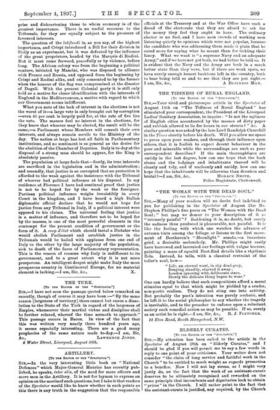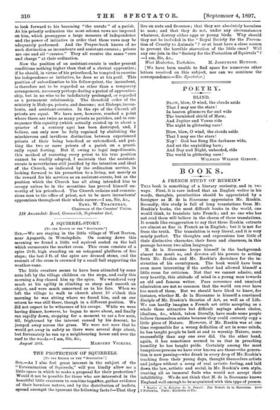ELDERLY CURATES.
[To THE EDITOR OF THE "SPECTATOR."]
SIR,—My attention has been called to the article in the Spectator of August 28th on "Elderly Curates," and I should be glad if you will permit me to say a few words in reply to one point of your criticisms. Your writer does not consider "the claim of long service and faithful work in the Church" to be entitled to much weight as regards promotion to a benefice. Now I will not lay stress, as I might very justly do, on the fact that the work of an assistant-curate deserves to be ultimately recognised and rewarded on the same principle that incumbents and dignitaries look to obtain "
prizes" in the Church. I will rather point to the fact that the assistant-curate is justified, nay required, by the Church to look forward to his becoming "the curate" of a parish. At his priestly ordination the most solemn vows are imposed on him, which presuppose a large measure of independence and the power of initiative in order that these vows may be adequately performed. And the Prayer-book knows of no such distinction as incumbents and assistant-curates; priests are one and all "curates." They all receive the same "cure and charge" at their ordination.
Now the position of an assistant-curate is under present conditions nothing higher than that of a clerical apprentice ; if he should, in virtue of his priesthood, be tempted to exercise his independence or initiative, he does so at his peril. This position of subordination to his fellow-priest, the incumbent, is therefore not to be regarded as other than a temporary arrangement, necessary perhaps during a period of apprentice- ship, but in no wise to be indefinitely prolonged, or regarded as a permanent relationship. The threefold order of the ministry is Bishops, priests, and deacons ; not Bishops, incum- bents, and assistant-curates. In the eye of the Church all priests are equal. We have now, however, reached a point where there are twice as many priests as parishes, and in con- sequence this equality (which actually existed up to about a quarter of a century ago) has been destroyed, and, I believe, can only now be fully regained by abolishing the mischievous and invidious distinction between experienced priests of their being beneficed or unbeneficed, and put- ting the two or more priests of a parish on a practi- oally equal footing. But if, owing to legal impediments, this method of restoring every priest to his true position cannot be readily adopted, I maintain that the assistant- curate is nevertheless still justified by the intention and ideal of the Church, as indicated by the ordination service, in looking forward to his promotion to a living, not merely as the reward for his services as an assistant-curate, but as the position which the Church has all along intended him to occupy unless he in the meantime has proved himself un- worthy of his priesthood. The Church ordains and commis- sions men to the office of priest, not to be mere incumbents' apprentices throughout their whole career.—I am, Sir, &c., SAML. W. THACKERAY, Chairman of the Curates' Union.
118 Annandale Road, Greenwich, September 2nd.



































 Previous page
Previous page